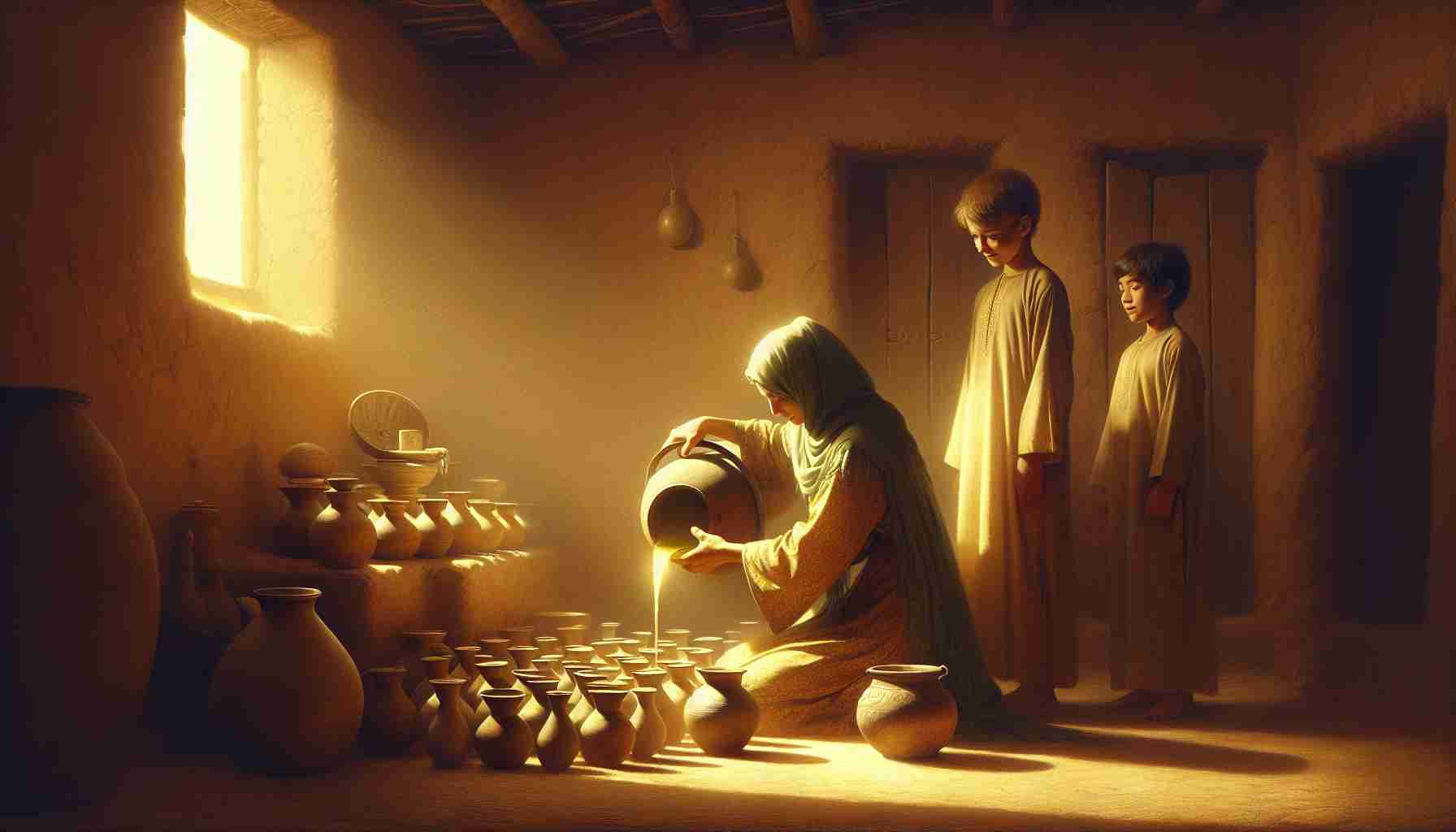

The jar was heavier than I remembered.
I lived in the days of the prophet Elisha, when widows like me were easily forgotten. My husband had once followed Elisha—part of the group who studied Torah and served Hashem, the name we speak with reverence. But when he died suddenly, he left behind nothing but debts.
The creditors came within days. One of them even tried to take my sons as payment.
I wanted to scream. To tell them my husband feared Hashem. That we didn’t deserve this. But instead, I wept.
More than once, I thought of hiding my sons. Telling them to run into the hills. But I knew he wouldn’t have wanted that. Not if it meant living a lie.
So one morning, with nothing left to lose, I went to find Elisha.
He listened. Then asked gently, “What do you have in your house?”
“Nothing,” I said. Then paused. “Well… a jar of oil.”
He smiled like that was enough. “Go borrow vessels from your neighbors,” he said. “Not a few. As many as you can find. Then close your door and pour.”
I stared at him. “Pour the oil?”
He nodded.
So I did.
My sons ran through the village, knocking on every door. We gathered all the pots, bowls, and jars we could find—maybe two dozen. I closed the door and picked up my tiny jar.
It wasn’t enough for a full meal.
I tipped it gently over the first bowl. Oil flowed out.
And it kept flowing.
One jar. Two. Five. Ten. My hands began to tremble. Still it poured. We filled every vessel in the house, and only then did it stop.
When I told Elisha, he said simply, “Sell the oil. Pay your debts. And live on what’s left.”
We did. And we never lacked again.
I still keep the first jar. It’s empty now. But when I see it, I remember.
Not just the miracle. But that mercy found us when I was too tired to ask and too poor to give.
Sometimes, what saves you doesn’t look like strength.
Sometimes, it looks like trust—poured out, one quiet act at a time.
The jar was heavier than I remembered.
I lived in the days of the prophet Elisha, when widows like me were easily forgotten. My husband had once followed Elisha—part of the group who studied Torah and served Hashem, the name we speak with reverence. But when he died suddenly, he left behind nothing but debts.
The creditors came within days. One of them even tried to take my sons as payment.
I wanted to scream. To tell them my husband feared Hashem. That we didn’t deserve this. But instead, I wept.
More than once, I thought of hiding my sons. Telling them to run into the hills. But I knew he wouldn’t have wanted that. Not if it meant living a lie.
So one morning, with nothing left to lose, I went to find Elisha.
He listened. Then asked gently, “What do you have in your house?”
“Nothing,” I said. Then paused. “Well… a jar of oil.”
He smiled like that was enough. “Go borrow vessels from your neighbors,” he said. “Not a few. As many as you can find. Then close your door and pour.”
I stared at him. “Pour the oil?”
He nodded.
So I did.
My sons ran through the village, knocking on every door. We gathered all the pots, bowls, and jars we could find—maybe two dozen. I closed the door and picked up my tiny jar.
It wasn’t enough for a full meal.
I tipped it gently over the first bowl. Oil flowed out.
And it kept flowing.
One jar. Two. Five. Ten. My hands began to tremble. Still it poured. We filled every vessel in the house, and only then did it stop.
When I told Elisha, he said simply, “Sell the oil. Pay your debts. And live on what’s left.”
We did. And we never lacked again.
I still keep the first jar. It’s empty now. But when I see it, I remember.
Not just the miracle. But that mercy found us when I was too tired to ask and too poor to give.
Sometimes, what saves you doesn’t look like strength.
Sometimes, it looks like trust—poured out, one quiet act at a time.